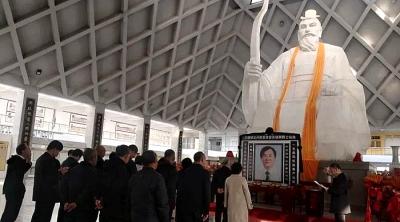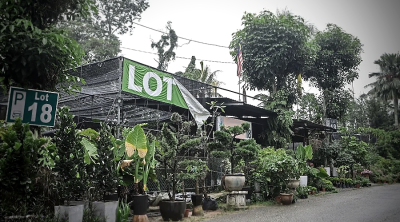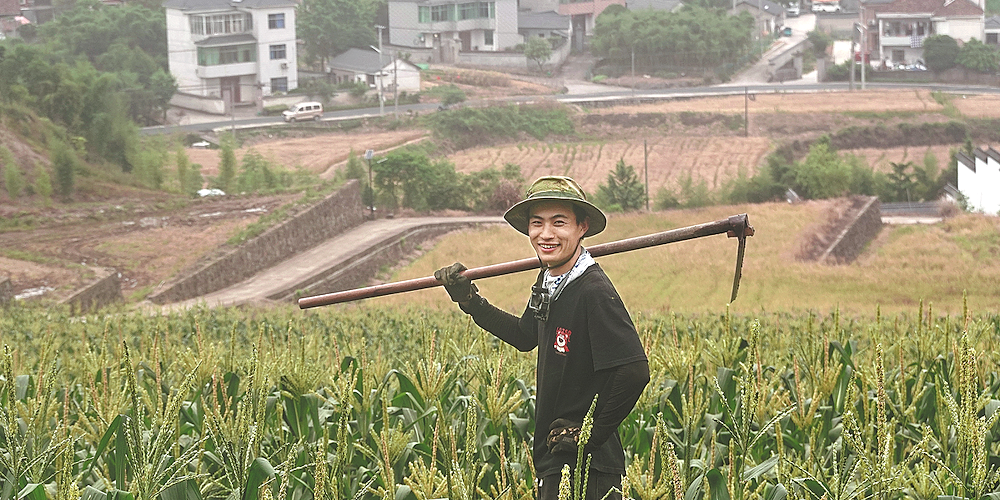
In the bustling heart of Shanghai, where life pulsates under towering skyscrapers and neon streetlights, 24-year-old Liang Yu once worked as a full-time model.
After graduating from college with a major in broadcast television, she had planned to work in the film industry or advertising. However, today she unexpectedly finds herself toiling on a farm and not missing the glamour of her previous life.
Along with her boyfriend, Wang Kairui, who is four years older than her, Liang runs a 0.3-hectare farm in suburban Shanghai. Their farm, New Field, grows a variety of produce including tomatoes, pumpkins and chilies.
“I never considered working on a farm and I knew nothing about farming,” said Liang, who was born and raised in Guangzhou, Guangdong province, and came to Shanghai to study at the Shanghai Institute of Visual Arts.
“The first time I ate a tomato that I had planted myself, I was amazed. It tasted sweeter than anything available in the stores. I was very excited,” she recalled.
Like many young people, Liang used to live a hectic life with her boyfriend, who worked as a photographer. Their mornings were a blur of coffee shots and commuter trains, and their evenings a whirlwind of networking events. They often stayed up late at night finishing work projects.
The turning point came in 2022 when they were confined at home during the COVID-19 epidemic and decided to grow tomatoes in their yard.
“We lived with three roommates and we all felt bored and frustrated back then. We started experimenting with planting tomato seeds in our small yard as a way to kill time,” said Liang.
“None of us had any knowledge about growing tomatoes and my boyfriend started educating himself by reading instructions online. He would get up early in the morning to observe the tomatoes. We spent much of our time in the small yard.
“I can still recall vividly when we harvested our first tomato, we divided it into five parts for each of us. It was so fresh and natural,” said Liang.
She said something stirred in the couple — a longing for authenticity, a connection to nature, and a desire for a simpler way of life.
Liang and Wang made a decision that would surprise their families and friends, and invested their savings in the farm. She still works part time as model and photographer to support the farm operations.
The duo spend a lot of time in the village managing the farm. They have gained more knowledge about seeds, learned about new farming technology and picked the farmers’ brains for ideas.
“There are over 10,000 tomato varieties. We’ve experimented with about 400. Now, 90 percent of our daily food is grown by ourselves,” Liang said.
Wang said: “Observing and witnessing the growth of vegetables brings us a sense of achievement, which we could not get from our other jobs.
Farming has taught us to slow down and expand our knowledge in areas such as farming technology, business management, and marketing. It’s a process that is very inspiring.”
Seasonal variety
During harvest season, their days start at 3 am and end at 11 pm. They have learned to cope with different situations, especially dealing with unfavourable weather conditions, which have a huge impact on the vegetables.
Working on the farm has also given them a different perspective about the rhythm of life in rural communities, which follows the planting and harvesting seasons.
Liang and Wang are among a growing number of young Chinese people living in villages and becoming “new farmers”.
The concept of rural revitalisation was introduced by the government in 2017 and is a key part of the national development policy to stimulate local economies and guarantee food supplies, according to the Ministry of Agriculture and Rural Affairs.
By 2025, more than 15 million people are expected to return to their home villages and start businesses, according to a ministry report.
On social media platform Xiaohongshu the hashtag “recording my life in the village” has garnered more than 2.5 billion views. Hashtags for “new peasant,” have been viewed about 100 million times.
Liang and her boyfriend also use social media platforms to record and share their life on the farm, which has gained them a large fan following.
“Many people have left us messages. Some ask about the farming experience while others express their wish to return to the villages,” she said.
“Nowadays, we young people want to break away from the traditional roles given to us by society, and choose jobs that are not considered mainstream, such as a new farmer”.
Liang’s father is an entrepreneur who understands and supports his daughter’s decision to become a farmer. However, Liang’s mother was initially cool on the idea.
“She works in government so she wants me to have a stable job like her. But gradually, by watching my videos she understood what I want to do,” said Liang.
“Though our farm is still not able to grow enough to cover our rent and other bills, we are optimistic about what we do and will keep on doing it.”
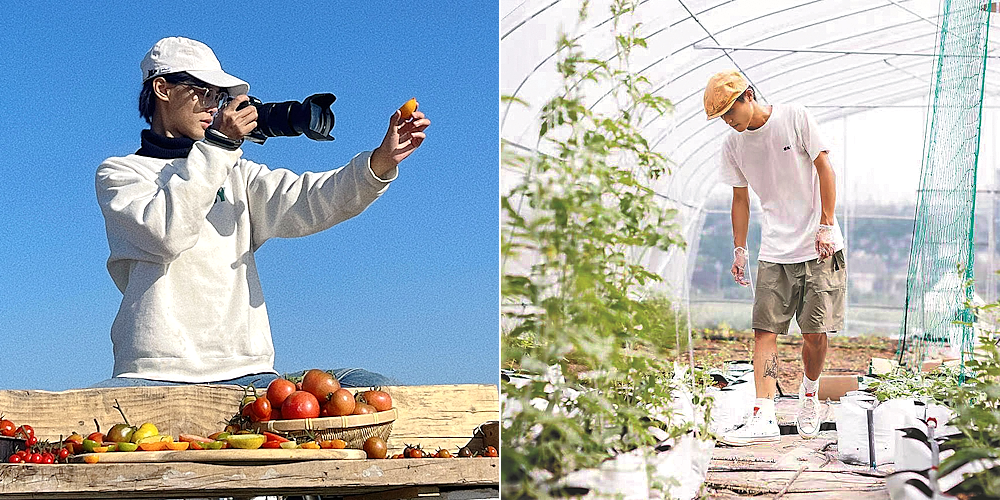
Son of the soil
Like Liang and her boyfriend, 28-year-old Shao Qiankuan quit his job as an aviation security officer in Hangzhou, Zhejiang province, and now works on a 300-mu (20-hectare) farm in the suburbs of Hangzhou.
Unlike the couple, Shao is familiar with agricultural life as his family has a farm in Jiamusi, Heilongjiang province.
“My former job, which I did for about six years, was very stable and paid me well,” he said.
“However, I gained nothing new. I had considered quitting for a long time and discussed it with my parents. Thankfully, they supported me.”
He worked for free for experienced farmers to acquire their agricultural knowledge. After learning the basics of farming, he rented land with a few like-minded friends where they mainly grow rice and corn.
“Each day is different and I feel that every day over the past two years I have made progress,” said Shao, adding that farm work has helped him to master other skills, such as tractor repairs and fighting floods during the rainy season.
“My day starts early in the morning with sowing seeds and tending to crops. After working on the farm for the whole day I edit my videos, which I share on social media platforms. My life has been enriched,” he said.
Shao said he has met many young people like himself who receive an education in a big city, but give up on urban life and return to the village. “It’s a trend,” he said.
One of his new friends is Ren Yin, 27, who owns a coffee shop in Hongcun village located near Jingshan Temple. The temple was built during the Tang Dynasty (618-907) and is located about 60 kilometres from Hangzhou.
As village entrepreneurs, the pair exchange ideas, help each other out and navigate challenges together.
Better latte, than never
Ren was born in Hongcun and left her hometown to study in Hangzhou. She graduated from Hangzhou Normal University in 2019 with a major in teaching Chinese as a second language.
Ren later furthered her studies at the Hong Kong University of Science and Technology, where she obtained her master’s degree in 2021.
However, as the pressure of looking for a job increased, she turned her back on the rat race in the city and returned to the village, which is nestled in rolling hills and fields, where she was born and raised.
In early 2023, she opened the coffee shop, which is named Lai Yin. The move was not without its challenges.
Her decision was initially met with scepticism by her parents who couldn’t understand why she would willingly trade the comforts and opportunities of the city for country life.
She discussed her proposal of opening a coffee shop with the village leaders, who supported her and invested about 300,000 yuan (RM188,000) in the business. The first six months of rent was waived.
About 40 square metres in size, the coffee shop, designed by Ren, is a two-floor building constructed from two shipping containers.
The majority of Ren’s customers are tourists, cyclists and motorcycle riders who are attracted by beautiful winding mountain roads that stretch for about 20 kilometres. The coffee shop has a parking lot to cater for them.
As Ren has settled back into a bucolic lifestyle, her once-racing mind has gradually attuned itself to the gentle rhythms of rural life. The buzz of traffic has been replaced by the symphony of birdsong at dawn, and the chirps of crickets at dusk.
“I have found joy in the simplicity of life, which allows me to be close to nature and discover a profound sense of belonging,” she said.
“Urban life can be fast-paced, stressful, and expensive. Returning to rural areas offers a quieter, more affordable lifestyle with cleaner air, closer family ties, and a slower pace of life, which can be appealing for those seeking better overall quality of life.”
Utilising resources
Shen Junming, 44, once worked in architectural design. In 2015, he began managing rural homestays, but due to the pandemic he returned to his hometown of Hangzhou.
There he applied for the job of rural operations manager in Hongcun, a position established in 2017 with the support of the government.
Shen said at first he didn’t fully understand what the job entailed. “Over the years, I developed my own understanding of it,” said Shen, adding that the job is mainly about being responsible for planning, coordinating, and supervising all operational aspects of the village, as well as using idle resources, and boosting employment.
“The idle resources are not only about vacant spaces such as houses, land and ponds, but also idle human resources. Some elderly people stay at home with not much to do.
“However, through the introduction of certain industries, these individuals can engage in production and activities in their village, or even start businesses, thereby increasing their income,” said Shen.
Hongcun covers an area of approximately 10.97 square kilometres with nearly 2,000 residents living in 608 households, making it quite large in size. Besides the major attraction of Jingshan Temple, the village is also known for heng fan dofu gan (heng fan dried tofu), and sanheyuan bamboo salt.
Shen said over the past four years, the village has not only seen tangible economic benefits but also changed villagers’ mindsets so they can see the opportunities created by new industries and more visitors.
“Originally, Hongcun faced challenges due to poor road links and being a remote village. At that time, there were no businesses, not even convenience stores.
“Over the past four years, things have changed, with more and more young people coming here and running their own businesses,” Shen said, adding that the village provides support such as facilitating the establishment of new businesses and reducing barriers for young entrepreneurs.
This has resulted in the population growing with the arrival of new settlers, more village cooperative enterprises, and a twofold increase in the village’s collective economy from 2021 to 2022, said Shen.
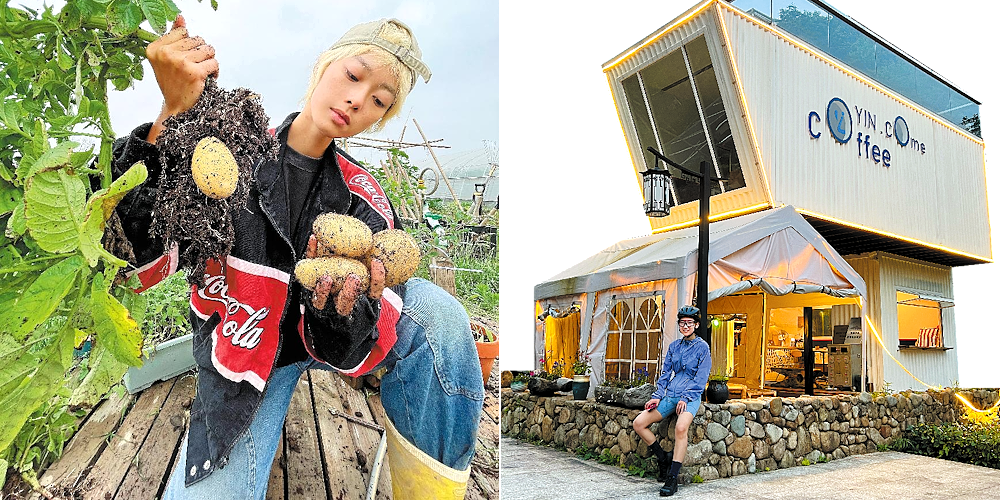
ADVERTISEMENT
ADVERTISEMENT
















